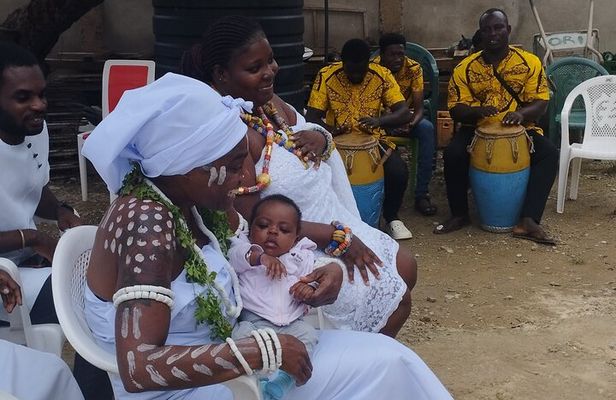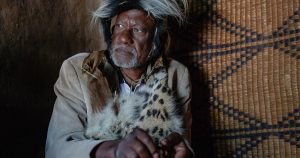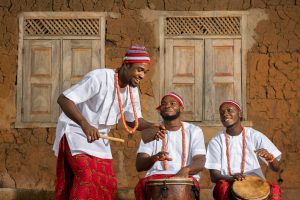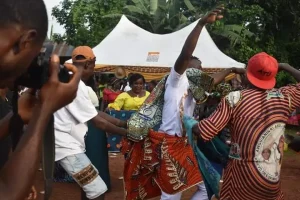Among the Igbo people of southeast Nigeria, the Igu Afa, or Naming Ceremony, is a fundamental cultural event. Deeply ingrained in the Igbo perspective, where names are seen to have great power and significance, this rite symbolizes the official arrival of a baby into the family and the society. The ceremony binds the person to their ancestors, family, and society by means of a spiritual, cultural, and social rite, therefore transcending mere formal events. Providing insight on its place within Igbo culture, this thorough essay investigates the importance, method, and cultural ramifications of the Igu Afa.
Cultural and Spiritual Significance
Names in Igbo society capture the hopes, prayers, and ambitions of the family for the infant, not just as labels. A child’s name typically symbolizes their circumstances around birth, familial background, or connection with the supernatural. For the Igbo, a name is a potent statement of identity and is said to determine the child’s fate. This attitude emphasizes the significance of the Igu Afa as the ritual not only names the kid but also symbolically defines his destiny.
Additionally a means of connecting the infant to the lineage and the larger Igbo society is the Igu Afa. The ceremony affirms the child’s rights and obligations, therefore acknowledging their position in the family and society. It is also a celebration of thankfulness and joy as the society comes together to embrace the gift of fresh life and the kid into their fold.
Preparations for the Ceremony
Usually scheduled on the eighth day after the birth of the infant, the Igu Afa might change based on family wishes or particular situation. The ceremony’s preparations include the close and extended family as well. Although other family members—especially the grandparents and seniors—are also quite engaged, the child’s parents take front stage in planning the occasion.
The family visits a diviner or elder to choose the suitable kid name before the ceremony. This session is very important as it is thought that the child’s name should reflect their spiritual core and the fate of the family. The diviner could also provide direction on the customs to be carried out during the event and the sacrifices to the ancestors and gods.
The family gets ready for the ceremony—including food, beverages, and gifts—once the name is selected. Typically attended by close family members, friends, and well-wishers, the celebration takes place in the family property or the house of the paternal grandparents. The celebration gives the family a chance to display their hospitality and kindness as they feed and entertain their visitors.
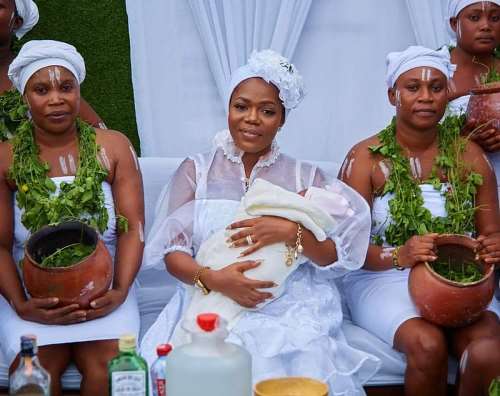
The Naming Ceremony
Lead by the oldest male family member—often the child’s grandpa or an older uncle—the Igu Afa starts with a set of rites and prayers. Inquiring for protection, health, and prosperity for the child, the elder calls upon the blessings of the gods and ancestors. Since they create a spiritual link between the infant and the ancestral line, these prayers are very vital for the ceremony.
The real infant naming ceremony of the Igu Afa is its core custom. The older puts the infant in his arms and, in front of the gathered relatives and friends, gently and deliberately pronounces his name. Usually, the name is repeated numerous times to guarantee that everyone present will clearly hear and remember it. Along with this act of naming, libations—a symbolic tribute to the ancestors and gods—pour out.
Once the name is said, the elder usually explains its meaning and importance for the assembly. This clarifies the name’s significance within the family’s past as well as the larger Igbo cultural perspective. If the family has prayed for a long time for a child, the name may represent the circumstances of the child’s birth, say “Nwachukwu,” (child of God), expressing the family’s thanks for conquering obstacles, or “Ifeanyi,” (nothing is impossible with God).
The elder blesses the youngster after the naming by putting a kola nut in his hand and praying more for his welfare. Considered a holy emblem in Igbo society, the kola nut stands for continuity, vitality, and unification. To represent the child’s desire for a rich and full life, the elder can add dab a little bit of palm wine or water on their lips.
Celebration and Festivities
Following the official ceremonies of the Igu Afa, family members and visitors engage in a happy celebration sharing food, beverages, and music. The celebration is a crucial component of the ceremony as it gives the society a chance to gather and show their gladness and encouragement of the new family member.
With drumming, singing, and dancing creating a vibrant environment, traditional Igbo music and dance frequently take front stage in the celebrations. Presenting presents to the parents and the kid will also be part of the celebration, thereby signifying the community’s will to help the child’s development.
Especially those who were instrumental in the pregnancy, delivery, and naming ceremony, the parents could formally thank the visitors and relatives who have helped them during the celebration. This recognition helps to strengthen the feeling of community and shared responsibility that define Igbo society.
Cultural Implications and Continuity
The Igu Afa is an essential cultural institution guaranteeing the preservation of Igbo identity and values, not just a family celebration. Participating in the ritual helps the family and the community to reaffirm their will to protect their cultural legacy and forward it to next generations.
The event reminds us also of the significance of names in Igbo society. Names hold weight of history, spirituality, and familial expectations so they are not taken lightly. The Igu Afa supports the belief that a person’s name is essential component of their identity and that it may determine their fate.
Many Igbo families, both in Nigeria and the diaspora, still celebrate the Igu Afa today. The fundamental components of the ceremony—the spiritual importance, the community engagement, and the focus on cultural continuity—remain constant even if some of its features may have changed or been adapted to contemporary settings.
Conclusion
The Igu Afa, often known as Naming Ceremony, is a rich statement of Igbo spiritual and cultural ideals. Connecting a kid to their family, ancestors, and community, it is a rite of passage that starts their trip through life. The Igbo people honor the power of names as bearers of identity, fate, and cultural legacy throughout the event.
The Igu Afa is a community festival meant to strengthen social ties and guarantee the continuation of Igbo customs, not just a personal or familial one. The Igu Afa is still a crucial habit that preserves the cultural identity and passes on their values to next generations as the Igbo people negotiate the difficulties of contemporary life.
Please read all our stories on African Culture here
